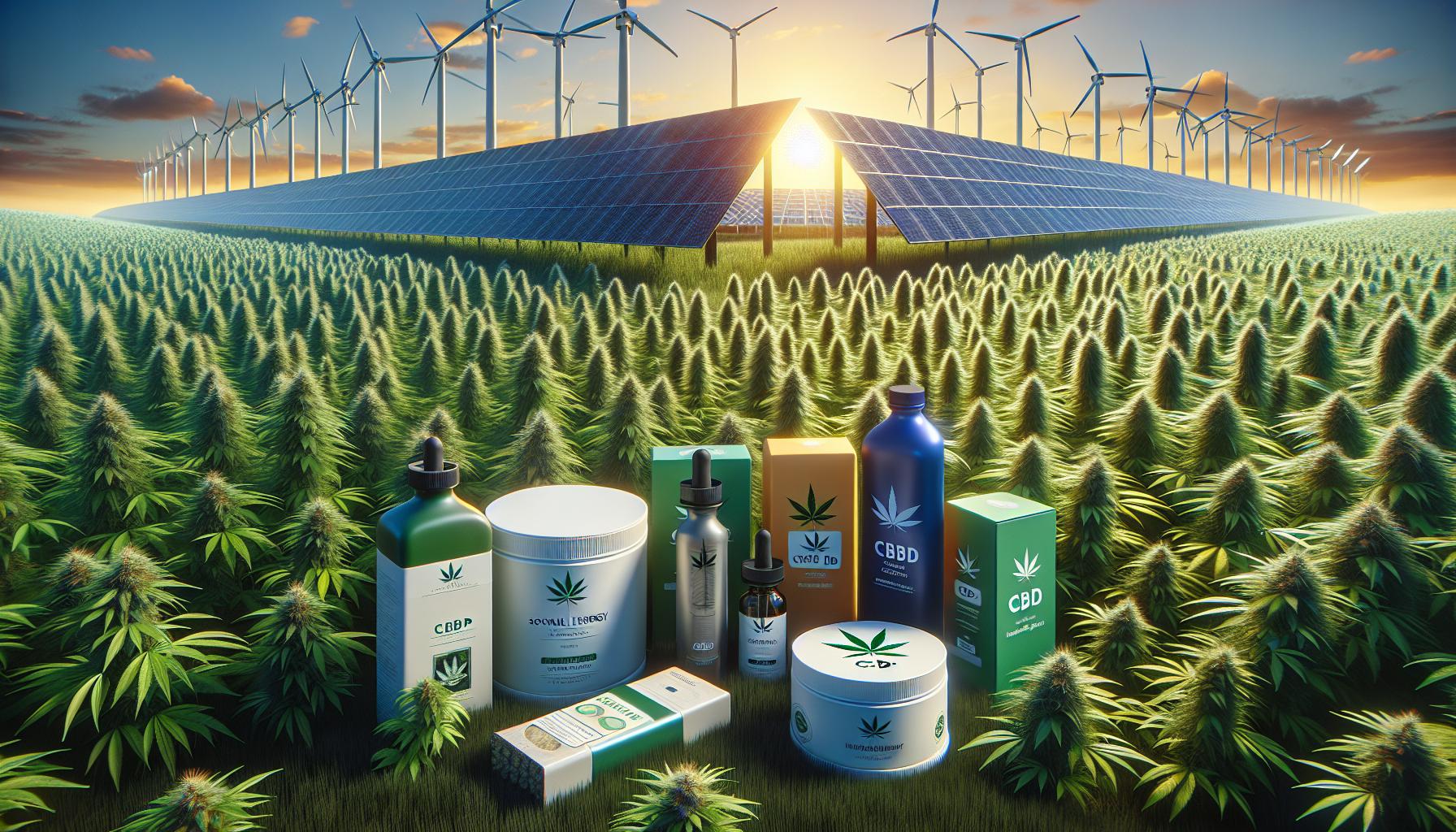UK CBD Sector: Top Practices for Promoting Sustainability
As the UK’s CBD market continues to flourish, the spotlight on sustainability within this sector grows brighter. With consumers increasingly prioritizing eco-friendly products, businesses are stepping up their game to meet these expectations. But what does it really take to promote sustainability in the UK CBD sector?
From sourcing ethically produced hemp to implementing green manufacturing processes, the journey towards sustainability is multifaceted. This article delves into the best practices that are setting the standard for a greener, more sustainable CBD industry in the UK. Join us as we explore how businesses such as https://cbd.co/cbd-vape/ are not just meeting the demand for high-quality CBD products but are also paving the way for a more sustainable future.
Key Takeaways
- The UK CBD sector is increasingly prioritising sustainability, responding to consumer demand for eco-friendly products by adopting practices such as ethically sourcing hemp and implementing green manufacturing processes.
- Ethical sourcing of hemp, crucial for the sustainability of the CBD market, involves choosing hemp from organic, pesticide-free farms, fostering partnerships for improved practices, and prioritising local sourcing to reduce carbon emissions.
- Green manufacturing in the CBD industry includes using renewable energy sources, conserving water through closed-loop systems, aiming for zero-waste production cycles, and choosing sustainable packaging options.
- Packaging innovations are crucial to reducing the environmental impact of the CBD sector, with shifts towards biodegradable materials, recyclable packaging, and minimalistic design reducing waste and appealing to eco-conscious consumers.
- Collaboration with recognised sustainability certifications and environmental initiatives showcases the sector’s dedication to eco-friendly operations, helping assure consumers of the environmental responsibility of their favourite CBD products.
- These practices delineate a collective effort towards a more sustainable future in the UK’s CBD sector, setting new industry standards that blend quality with environmental stewardship.
Importance of Sustainability in the UK CBD Sector
The UK’s CBD market is growing at an unprecedented rate, with sustainability at its core. As consumers become more environmentally conscious, the demand for eco-friendly CBD products is on the rise. This shift is not just about making a choice for healthier living but also about making responsible decisions that benefit the planet.
Sustainability in the CBD sector involves several key practices, starting with the farming of hemp. Ethically grown hemp, sourced from organic farms, lays the foundation for a sustainable product. These farming practices avoid the use of harmful chemicals and pesticides, ensuring the soil and surrounding ecosystems are preserved. Moreover, sustainable farming also means adopting crop rotation and other natural methods that boost the health of the crop without depleting resources.
Green Manufacturing Processes are another cornerstone of sustainability in the CBD industry. Companies are investing in state-of-the-art technology to reduce energy consumption and minimise waste during production. Sustainable packaging, made from recyclable or biodegradable materials, further underscores the industry’s commitment to reducing its carbon footprint. By focusing on the entire lifecycle of the product, businesses are not only providing high-quality CBD products but also contributing to a healthier planet.
Transparency is paramount in promoting sustainability within the CBD sector. Brands that are upfront about their sourcing and manufacturing processes tend to gain more trust among consumers. They’re often seen as leaders in the drive towards a more sustainable future. This open communication allows consumers to make informed decisions about the products they choose, aligning their purchases with their environmental values.
The push towards a greener CBD industry in the UK is truly a collective effort. From farmers and manufacturers to retailers and consumers, everyone plays a vital role. As the market continues to evolve, these sustainable practices are setting new standards, ensuring the CBD industry remains at the forefront of environmental responsibility. Sustainability is not just a trend but a core principle that shapes the way we think about, produce, and consume CBD products.
Ethical Sourcing of Hemp: Key to Sustainability
In the UK’s CBD market, the move towards sustainability is in full swing. At the heart of this shift lies the ethical sourcing of hemp. This practice is not just a trend but a fundamental process that ensures the environmental footprint of each product remains minimal. Ethical sourcing involves selecting hemp from farmers who adhere to organic, pesticide-free cultivation methods. These methods contribute significantly to soil health and biodiversity, principles that are vital for the sustainable growth of any agricultural sector.
One pivotal aspect of ethical sourcing is the close relationship between retailers and farmers. This partnership guarantees that the cultivation methods employed meet high environmental standards. It’s a bond that fosters transparency, allowing consumers to trace the origins of their CBD products back to the farm. Moreover, such collaborations often lead to the improvement of farming practices, as shared knowledge between parties enhances the quality of hemp produced.
Another essential element of ethical sourcing is the emphasis on local sourcing. By prioritising hemp grown within their region, UK CBD companies reduce carbon emissions associated with transportation. Reducing these emissions is a critical step in combating climate change and promoting a healthier planet.
The acquisition of certification plays a crucial role in ethical sourcing. Certifications from reputable organisations serve as a testament to the sustainability and ethicality of sourcing practices. They provide consumers with the assurance that the products they’re purchasing meet stringent environmental and ethical standards. Moreover, these certifications often encourage other businesses to adopt similar practices, setting a new benchmark for sustainability within the CBD sector.
Equally important is the commitment to continuous improvement. Ethical sourcing is not a static achievement but a dynamic process that evolves with emerging sustainable technologies and practices. Companies that stay ahead of the curve in adopting innovative cultivation and processing techniques set the stage for a greener future in the CBD industry.
By integrating these practices, the UK’s CBD sector is making notable strides in promoting sustainability. Ethical sourcing of hemp stands as a testament to the industry’s dedication to environmental stewardship and social responsibility, principles that resonate with a growing number of consumers seeking eco-friendly alternatives.
Implementing Green Manufacturing Processes
In the journey towards a greener future, the UK CBD sector is taking significant strides by integrating green manufacturing processes. These practices not only enhance sustainability but also align with the growing consumer preference for eco-friendly products. By prioritising the environment, CBD manufacturers are setting new industry standards.
Renewable Energy Sources play a crucial role in reducing the carbon footprint of CBD production. Forward-thinking companies are shifting from fossil fuels to solar, wind, and hydroelectric power to operate their facilities. This transition not only reduces emissions but also decreases operational costs in the long run, making it a savvy business decision.
Water conservation is another area where the CBD sector is innovating. Through the adoption of closed-loop systems, manufacturers are able to recycle and reuse water, minimising waste. This process is essential in promoting sustainable water use, a critical aspect given the global concerns over water scarcity.
Waste reduction strategies are being implemented across the board. The aim is to move towards a zero-waste production cycle where all parts of the hemp plant are utilised. From the leaves and flowers, which contain the valuable compounds, to the stalks and seeds, used in a variety of industrial applications, every element has its place. By doing so, the industry is not only minimising waste but also amplifying the value derived from hemp.
Packaging plays a pivotal role in sustainability efforts. Companies are now opting for biodegradable, recyclable, or compostable packaging solutions to decrease their environmental impact. This shift not only appeals to environmentally conscious consumers but also contributes to the reduction of plastic pollution, a pressing global issue.
These green manufacturing processes illustrate the CBD sector’s commitment to environmental stewardship. By adopting sustainable practices, companies are not only enhancing their eco-credentials but also meeting the evolving demands of consumers seeking responsible brands. As the industry continues to grow, these practices will likely become more widespread, cementing sustainability as a core component of the UK CBD sector’s ethos.
Packaging Innovations to Reduce Environmental Impact
In the UK CBD sector, companies are revolutionising their approach to packaging. This shift is fundamental in reducing the industry’s environmental footprint and resonates with the growing consumer demand for eco-friendly products. Recent advances in packaging solutions are setting new sustainability standards, aiming to minimise waste and decrease the reliance on non-renewable resources.
One significant innovation comes in the form of biodegradable materials. These materials break down naturally in the environment, leaving no harmful residues behind. As a result, they offer a promising alternative to traditional, single-use plastic packaging, notorious for its damaging effects on the planet. Biodegradable packaging materials, including hemp-based plastics, present an eco-conscious choice, aligning seamlessly with the green ethos of the CBD industry.
Additionally, the adoption of recyclable packaging further underscores the sector’s commitment to sustainability. By using materials that consumers can recycle after use, companies ensure that packaging does not end up in landfills but instead serves a new purpose. Glass and metal containers are among the top choices for recyclable CBD product packaging, offering both sustainability and a premium feel without compromising the quality or integrity of the contents.
Moreover, the trend towards minimalist packaging reduces material use and waste. This approach emphasises simplicity and efficiency, cutting down on unnecessary packaging layers and focussing on the essentials. Not only does this minimise environmental impact, but it also caters to the growing consumer preference for simplicity and transparency in product presentation.
These innovative practices in packaging not only showcase the UK CBD sector’s dedication to environmental stewardship but also enhance brand loyalty. Consumers increasingly seek out brands that reflect their values, and companies at the forefront of sustainable packaging are poised to win their trust and support.
Conclusion
The UK CBD sector is making significant strides towards sustainability by adopting eco-friendly practices and partnering with environmental organisations. Through obtaining key certifications and investing in renewable energy, companies are demonstrating their dedication to reducing their carbon footprint. The shift towards sustainable packaging is also a notable effort to align with consumer preferences for green products. These initiatives are not only setting a new standard for environmental responsibility in the industry but are also bolstering the reputation of CBD products among eco-conscious consumers. By continuing on this path, the UK CBD sector is contributing significantly to a more sustainable future.


Leave a Reply